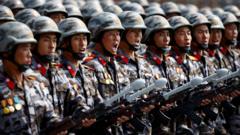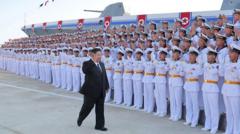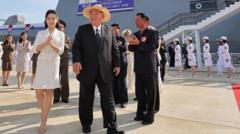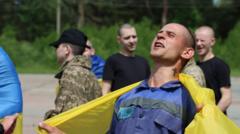In a landmark statement, North Korea has confirmed the deployment of its troops to assist Russian forces in Ukraine, marking a significant development in their military partnership.
North Korea Acknowledges Troop Deployment in Support of Russia's Ukraine Campaign

North Korea Acknowledges Troop Deployment in Support of Russia's Ukraine Campaign
Pyongyang confirms its military contribution to the conflict, revealing long-speculated alliances with Moscow.
North Korea has publicly acknowledged its decision to send troops to support Russia in the ongoing Ukraine conflict. This revelation follows a report from the state-run news agency KCNA, where the military highlighted the role of its soldiers in aiding Russian forces to "completely liberate" the Kursk border area as part of directives from leader Kim Jong Un. This announcement comes shortly after Russian Chief of Staff Valery Gerasimov praised the "heroism" exhibited by North Korean soldiers in combat, marking the first official recognition from Moscow of their presence.
Intelligence assessments from South Korea and Western nations had previously indicated that North Korea had dispatched around 11,000 troops to the region, with estimates suggesting that upwards of 1,000 of these personnel may have perished within three months of deployment. Gerasimov reiterated claims of Moscow regaining control over the western Kursk region, a point contested by Ukraine. In the wake of this announcement, U.S. officials emphasized that North Korea shares responsibility for exacerbating the ongoing conflict.
The KCNA report explained that the troop deployment was a fulfillment of a mutual defense agreement between North Korea and Russia, asserting that those who fought for the cause are regarded as "heroes" and symbols of national pride. Furthermore, the statement emphasized the "alliance and brotherhood" displayed during the military operations in Kursk, and hinted at the potential for continued support from North Korea towards Russian military efforts.
Details surrounding the eventual return of North Korean troops post-mission remain unclear. The news of their involvement had initially surfaced in October, coinciding with strengthened diplomatic and military ties between Kim Jong Un and Vladimir Putin, solidified by a joint treaty stipulating mutual military support against perceived aggressors. Military analysts have concerns about the readiness of North Korean soldiers, primarily from a reputed unit known as the Storm Corps, who may lack the necessary training for contemporary warfare scenarios.
Yet, despite doubts surrounding their preparedness, Ukraine's military leadership has indicated that North Korean forces are posing a serious challenge for Ukrainian defenses. General Oleksandr Syrskyi has characterized them as a considerable force, noted for their motivation and the use of traditional Soviet tactics, underscoring that their numerical strength complicates Ukraine's military strategies.
This evolving situation showcases the dynamics between North Korea and Russia within the broader context of the Ukraine conflict, as both nations signal their intent to bolster one another amidst growing international scrutiny.
Intelligence assessments from South Korea and Western nations had previously indicated that North Korea had dispatched around 11,000 troops to the region, with estimates suggesting that upwards of 1,000 of these personnel may have perished within three months of deployment. Gerasimov reiterated claims of Moscow regaining control over the western Kursk region, a point contested by Ukraine. In the wake of this announcement, U.S. officials emphasized that North Korea shares responsibility for exacerbating the ongoing conflict.
The KCNA report explained that the troop deployment was a fulfillment of a mutual defense agreement between North Korea and Russia, asserting that those who fought for the cause are regarded as "heroes" and symbols of national pride. Furthermore, the statement emphasized the "alliance and brotherhood" displayed during the military operations in Kursk, and hinted at the potential for continued support from North Korea towards Russian military efforts.
Details surrounding the eventual return of North Korean troops post-mission remain unclear. The news of their involvement had initially surfaced in October, coinciding with strengthened diplomatic and military ties between Kim Jong Un and Vladimir Putin, solidified by a joint treaty stipulating mutual military support against perceived aggressors. Military analysts have concerns about the readiness of North Korean soldiers, primarily from a reputed unit known as the Storm Corps, who may lack the necessary training for contemporary warfare scenarios.
Yet, despite doubts surrounding their preparedness, Ukraine's military leadership has indicated that North Korean forces are posing a serious challenge for Ukrainian defenses. General Oleksandr Syrskyi has characterized them as a considerable force, noted for their motivation and the use of traditional Soviet tactics, underscoring that their numerical strength complicates Ukraine's military strategies.
This evolving situation showcases the dynamics between North Korea and Russia within the broader context of the Ukraine conflict, as both nations signal their intent to bolster one another amidst growing international scrutiny.




















